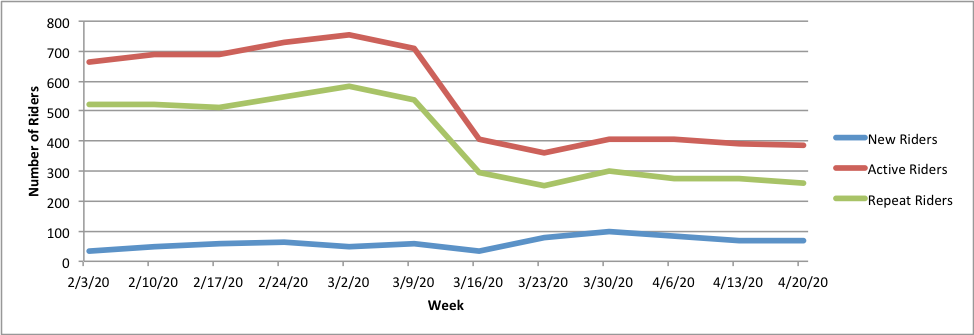Induced demand drives public transit and ridehail ridership moreso than any other mode. At a time when people may be going for walks, bicycle rides, or drives to clear their mind and get out of the house, few people are likely to hop on the bus or into an Uber for a joy ride. However, many essential workers still need to commute, and people still need access to groceries and household items. This change in travel behavior, along with changes in operating budgets, has led transportation agencies and companies to make a number of service changes.
Over the last few years, transit agencies and ridehail companies have formed innovative partnerships and collaborations to provide new mobility options to the public. In the Los Angeles region, LA Metro contracted with Via to provide first-mile last-mile (FLML) connections to select transit stations since January 2019. With COVID-19 prompting changes to the agency’s network, LA Metro worked with Via to adjust the service.
The partnership between LA Metro and Via was forged through a lengthy period of collaboration and effort, with both staff working together for months to negotiate risk responsibilities, data sharing, and other service provisions. The time and effort put into establishing clear communication and agreements between the two providers is now paying off. This strong, positive relationship was key to making split decisions with little resources for the sake of public health in the face of the COVID-19 crisis, and eventually restoring or adapting future service collaborations.
Just before the community spread of COVID-19 began early this year, LA Metro renewed its partnership with Via to continue a second year of the pilot. But as the reality of COVID-19 took hold, LA Metro and Via adjusted their service through a series of rapid changes beginning in late March. On March 23, just five days after applying service changes to LA Metro bus and train networks, the Partnership with Via switched to a point to point service within existing service zones as opposed to providing service to or from select train stations. The following day, shared rides were discontinued, making all rides private, and on Friday March 27, additional points of interest near the service zones such as grocery stores and pharmacies were added.
Amidst these changes, ridership on Metro’s Partnership with Via has declined by less than 50%, and the service even saw an uptick of new riders in March.

As the COVID-19 crisis continues, the service may be expanded to include package delivery within zones as well, with LA Metro and Via working with suppliers of items such as food and diapers to help low income households access these staples through free delivery. The resiliency of the partnership in Los Angeles with the agreement to amend service provisions shows the importance of strong foundations for public private partnerships to be able to adapt in the face of change and crisis.




